Libertarian Gary Johnson Files Suit To Gain Access To Presidential Debates
Libertarian Party Presidential candidate Gary Johnson has filed suit against the Commission on Presidential Debates for their refusal to include him in the upcoming Presidential debates:
Libertarian presidential nominee Gary Johnson has filed a lawsuit to win a spot in the presidential debates that start in Denver on Oct. 3.
It’s unlikely that he will succeed, but Johnson argues that the private Commission on Presidential Debates, along with the Democratic and the Republican parties, are unfairly blocking him from participating. Only President Barack Obama and GOP challenger Mitt Romney are being allowed to debate.
“Someone has to stand up and call this what it is—a rigged system designed entirely to protect and perpetuate the two-party duopoly,” says Johnson spokesman Ron Nielson. “That someone will be the Johnson campaign.”
(…)
Johnson, who is a former two-term governor of New Mexico, argues that the commission and the Democratic and Republican parties are colluding to exclude the Libertarian Party from the debates. He says this amounts to a violation of the Sherman Anti-Trust Act because the collusion limits competition and causes injury to both the American public and Gary Johnson.
The Commission on Presidential Debates, which has run every Presidential and Vice-Presidential debate for the past 24 years, was formed after the League Of Women Voters refused to sponsor the 1988 debates after it became aware that the Bush and Dukakis campaigns had agreed among themselves to an “understanding” that would exclude third-party candidates from the debates. The commission itself was formed by Frank Fahrenkopf, a former head of the Republican National Committee, and Paul Kirk, a former head of the Democratic National Committee, a fact that has led many to allege, with some justification I would submit, that the CPD was really just a tool of the two major parties. Under Commission rules, a candidate will only be invited to appear at the debates if they meet these three criteria:
- The candidate is Constitutionally eligible to serve as President (or, as applicable, Vice-President);
- The candidate has achieved ballot access in a sufficient number of states to comprise at least 270 Electoral Votes; and,
- The candidate has the support of at least 15% of the population based on the results of polls by five pollsters selected by the Commission.
Johnson satisfies the first two criteria, but does not satisfy the third given that the highest he has polled nationally recently has ranged between 1% and 2%.
In all likelihood, this lawsuit will not be successful, just as other challenges to debate rules set by private organizations have been unsuccessful. That doesn’t mean there isn’t some merit to the argument, though. Here we have an organization effectively controlled by the two major parties that effectively controls the four most important events of the General Election campaign season. On some level it’s unfair to the candidates and to the American public to exclude alternative points of view and, more importantly, it strikes me as a serious conflict of interest for the major political parties to be the ones that control the debate. At the very least, the public would be better served if organizing these debates were back in the hands of an independent organization like the League of Women Voters.
Here’s a copy of Johnson’s lawsuit:
Gary E. Johnson et al v. Commission On Presidential Debates et al
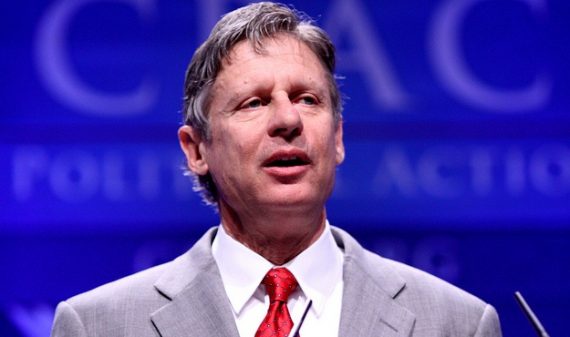


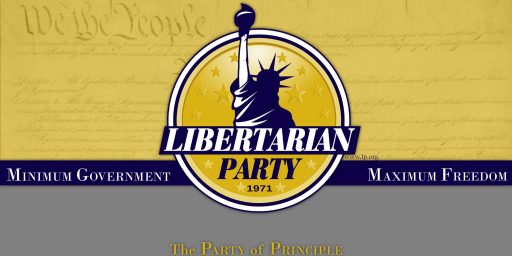
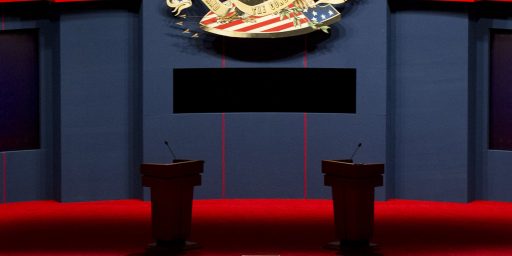
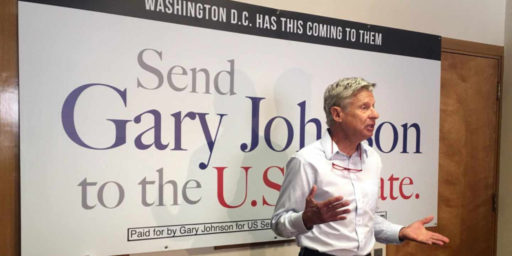
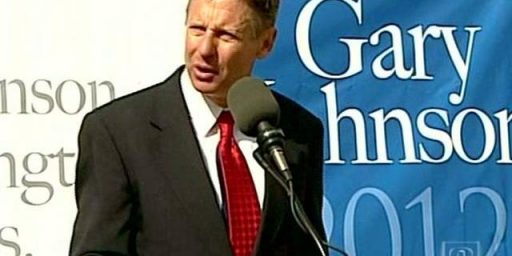
“As a libertarian, I demand that the state exercise its power to admit me to a debate sponsored by a private organization!”
Yeah, I’m persuaded.
Since it is based on polling, wouldn’t it be fairer to let more people in the first rounds, and then restrict it later? lol, you’d think a poll after national exposure would be a little more accurate.
(Some “who should I vote for” test told me I should vote for Jill Stein. Since I live in California, it’s probably safe for me to do that.)
He says this amounts to a violation of the Sherman Anti-Trust Act because the collusion limits competition and causes injury to both the American public and Gary Johnson.
Sherman Antitrust Act? The election is not trade or commerce, campaigns are not businesses, and voters are not consumers. I’m just a caveman, but I don’t think Sherman is applicable.
Different strategy to try: don’t sue the debate comission, sue the networks, arguing that unless they’re willing to offer the LP an equivalent block of time to argue their positions, the airing of the debates constitute an unreported in-kind donation to the Obama/Romney campaigns. How much do you think eight hours of prime time network TV coverage are worth?
@mantis:
Collusion under Section One of the act isn’t necessarily limited to profit making enterprises.
@Stormy Dragon:
“don’t sue the debate comission, sue the networks, arguing that unless they’re willing to offer the LP an equivalent block of time to argue their positions, the airing of the debates constitute an unreported in-kind donation to the Obama/Romney campaigns.”
Will that work for the Sunday talk programs as well? Can he sue NBC for not scheduling him when they give all their time on Meet the Press to Democrats and Republicans?
@Moosebreath:
I think there’s a big difference between talking about Republicans and Democrats and having the two candidates on to speak about why people should vote for them for an hour a piece.
@Stormy Dragon: It sounds to me like your First Amendment purist creds are slipping. Repent before you are forced to agree that the government can require TV networks to play that anti-Muslim video that keeps getting criticized.
The government has always maintained the position it owns the electromagnetic broadcast spectrum, so this isn’t a network issue. This is Democrats and Republicans using government power to limit voter access to third-party candidates. It would be a national service to have Gary Johnson and Jill Stein in the debates. Just think, there would be an actual discussion about the Patriot Act, civil liberties, reducing our global military footprint, global warming and conservation. All the things we little people aren’t supposed to think about!
@PD Shaw:
I’d be happy to allow the networks donate millions of dollars in free air time to the Obama/Romney campaign, provided the LBP was permitted to accept similarly large donations.
The notion that is bad a private organization reserves the right to refuse service seems incompatible with libertarianism. However, politics is filled with many ideological compromises
I do think there’s a good reason for a de minims requirement. Otherwise every nut and his horde of screeching monkeys will insist on “participating” in the debates. 15% is probably too high, given that the difference between the parties is so little.
How about allowing any candidate with more support than the difference between the two major parties be allowed to debate? This means if we really are balanced between two parties we get a passel of different candidates…. If it’s really lopsided, then any third party has to have a great show of strength.
Well, I do agree that candidates who aren’t on the ballot in enough states to even get to the 270 EV level should not be considered serious national candidates. And, obviously, anyone who somehow got on the ballot despite clearly not being eligible can be ignored.
@walt moffett:
It would be in a free market, but when the government limits the number of such organizations and bans people from starting competitors.
@grumpy realist:
I’d argue that being on enough ballots to be theoretically capable of winning sets the necessary bar if that’s your actual concern. Not many “screeching monkeys” are on the majority of state’s ballots.
@Stormy Dragon: That’s why the 270 vote eligibility requirement is a good filter. Ditto for percentage of approval. I still would like a system that would throw up a variety of candidates if we had votes almost balanced between two parties.
Anyone else interested in my suggested tweak? It would be interesting to see how many previous third-party runs would have qualified under it.
I would support things as is, but change the third rule involving polling to include the top 3 candidates rather than just a 15% threshold. One, it would bring in a fresh perspective; two, it would still limit the hordes of would-be’s from turning the debates into a circus. It would be funny if one year the top three didn’t include a GOP candidate. Additionally, even as eye rolling as it would be, I would still support this if it meant including Ron Paul in the debates. The reason we have Both-sides-do-it knee jerk reactions is because we only have two sides* in every debate.
*That being said, I do not support third parties. Its the additional perspective that’s constructive, not throwing in another monkey wrench into an already veto-heavy institution.
If that is the case, why stop with just the two of them? Why not have other third party candidates as well?
@Stormy Dragon:
Sorry, not seeing the difference. If NBC schedules one of the candidates for a session on Meet the Press, why is that not the same sort of contribution as having them on during the debates? Your positions seems way too close to the Fairness Doctrine for me.
@Stormy Dragon:
Hmm, Johnson is barred from spending his party’s money to buy air time? Is he barred from recruiting a network of unpaid stump speech givers, forum spammers, etc? Is he banned from putting together an ad-hoc network of low power radio stations, public access cable channels, etc to get out the message? Seems there are plenty of ways around the State monopoly, bu they require work and energy not petulant demands and foot stomping.
I like Gary Johnson. I don’t know that he’d make a great president, but I’d like to see someone who was a great president adopt some of his policies. I suspect that if more Americans were aware of him he’d poll much better.
I’d love to find a reason to agree with him on this, but his argument here is pretty weak.
Why not indeed!?!
Here is a list of 14 USA Political Parties in alphabetical order including the Constitution Party, the Green Bean Party, the Objectivist Party and the ever popular Prohibition Party.
(How come you are not on the list IP?)
http://politics1.com/p2012.htm
@walt moffett:
Yes. An hour of prime time network air would cost millions of dollars. If Comcast tried to give millions of dollars to Gary Johnson’s campaign, they’d be commiting a crime. Yet it’s prefectly okay for them to give millions of dollars to Obama and Romney.
And, if they have their way, the CPD will make sure it stays that low. It’s a catch-22, right? We can’t let you debate unless you’re polling well. But how will you poll well unless you debate?
Personally, I’d love to see Johnson up there, making both of these jokers squirm.
@ernieyeball: Indeed…thank you for making my point…
I’m not particularly satisfied with the iron bound two party system we have here, but c’mon. A Libertarian Party Candidate suing under anti-monopoly legislation? Are there any Libertarians out there that can defend this?
Conservative = A Liberal who’s been mugged.
Liberal = A Conservative talking about their own problems.
and now:
Government Interventionalist = A Libertarian who’s gonna lose an election.
Heh, me too but when I actually look at her website, I just can’t get into it. Whereas my matchup for Johnson was far lower (~75% or so, below Obama), but I plan to vote for him. I think it’s partly a weakness in the “test” and partly because I am predisposed to cutting Libertarians more slack than Greens (for reasons that may not actually stand up to scrutiny).
Anyway, I do like the idea of having more than just Team R and Team D at debates, but this isn’t gonna cut it.
@grumpy realist: A better standard is if they have ballot access on enough states to qualify to win the electoral college. It is a better standard because it is very difficult to put together the money and grassroots effort to get on the ballot as a third party on enough state ballots to win. This demonstrates enough support to at least be heard from, and at least has the benefit of being tied to the legal possibility of winning the Presidency.
@Eric Blitz: Also would have gotten rid of some of the other Republican contenders if they had stuck around….especially enjoyed Gingrich’s spluttering when he didn’t qualitfy for the ballot in Virginia….the lawsuit…and the other side came back with the “you waited too long to bitch” argument.
Ah, laches….a wonderful defense from equity. “He who sleeps on his rights loses them.”
@colleenmccool Dream ON! I’m voting Johnnson/Gray! I’m voting for good. I’m voting to Save the American Dream: Self-government freedom from big government corruption and oppression. I’m not voting for the lesser of two evils. Obama & Romney have deserted the American Dream.
I joined the Million Vote March! http://bit.ly/millionvote http://millionvotemarch.com/?page_id=25.
Retweet: I joined the Million Vote March! http://bit.ly/millionvote http://millionvotemarch.com/?page_id=25 VoteObamneyWasted Dream ON America! http://fb.me/1Fr1Kfp1O
Is everyone talking about that isidewith.com test? Man, that thing was a minstrel sideshow in terms of question phrasing.
http://www.theatlantic.com/politics/archive/2012/09/why-i-refuse-to-vote-for-barack-obama/262861/
There’s a strong argument for Johnson (note: it’s entirely foreign-policy/civil liberties). If I were a swing-state voter, I’d be in Connor’s Obama-as-LOTE camp (which I typically argue here). Since I’m not, I’m a likely Johnson voter (despite disagreeing with libertarians on tax/fiscal policy, scope of government, etc).
Kudos to Gov. Johnson, I hope he is successful, but it’s not likely. The “chosen two” are who the powers that be will allow to debate before the public. Both support endless undeclared wars, the NDAA, the Patriot Act, TARP, and other assorted bail-outs and violations of our civil liberties. The status quo will be retained regardless of who wins between the Dems and the GOP. As the late, great George Carlin would say to Johnson and other candidates desiring a change of direction in our country’s foreign and domestic policies, “It’s one big club, and you aint in it”.